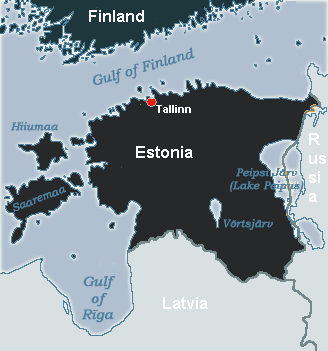Written Estonian Language
eesti keel

Similar to Finnish language.
- Finno-Ugric base to the language
Uses Latin script with no use of Russian cyrilic script at all.
Estonia sits at Geo-political crossroads of East and West
Estonian language/culture has been influenced by it big neighbours: Germany, Denmark, Sweden, Russia and Poland. As a result it has been influenced by all these.
From its language, it is closely related to Finnish, so leens more to Western Europe than Eastern Europe.
Russian is substantially less frequently used as in Lithuania or Latvia.
Differences between Finnish and Estonian
Finnish and Estonian speakers understand both languages in their written and spoken form. Estonian uses a lot of German originated words where as Finnish uses a lot of Swedish originated words.
Finnish also has similarities to Hungarian as they share the same language group (Uralic > Finno-Ugric).
Similarity between Finnish and Estonian
Estonian text
Kõik inimesed sünnivad vabadena ja võrdsetena oma
väärikuselt ja õigustelt. Neile on antud mõistus
ja südametunnistus ja nende suhtumist üksteisesse peab kandma
vendluse vaim.
Finnish text
Kaikki ihmiset syntyvät vapaina ja tasavertaisina arvoltaan ja oikeuksiltaan.
Heille on annettu järki ja omatunto, ja heidän on toimittava toisiaan
kohtaan veljeyden hengessä.
English translation
All human beings are born free and equal in dignity and rights. They
are endowed with reason and conscience and should act towards one
another in a spirit of brotherhood.
Estonian language
Nouns do not have a gender (like German, Russian, French which do). In its spoken form, it is spoken/pronounced how it is written.
Like Finnish, Estonian uses a lot of double letters: üü and õõ
Estonian Latin Alphabet
There are 23 letters in the Estonian alphabet.
The Estonian Latin script does not use F or Z.
C, F, Q, Š, W, X, Y and Ž are only used in loanwords and foriegn words/names.
It does use accents, see below:
Additions to Latin Alphabet (accents)
To type accents with ALT codes, hold down the ALT key, then on the numeric keypad type the three or four digits listed here. However not with laptops, ALT codes only work with the numeric keypad, NOT the row of numbers across the top of your keyboard, as on laptops.
a with diaeresis accent (umlaut)
ä Ä
o with tilde
õ Õ
o with diaeresis accent (umlaut)
ö Ö
u with diaeresis accent (umlaut)
ü Ü
Full Estonian alphabet
a A
b B
c C
d D
e E
g G
h H
i I
j J
j J
k K
l L
m M
n N
o O
p P
r R
s S
t T
s S
t T
u U
v V
a with diaeresis accent (umlaut)
ä Ä
o with diaeresis accent (umlaut)
ö Ö
o with diaeresis accent (umlaut)
ö Ö
u with diaeresis accent (umlaut)
ü Ü
Improvements to this site?
Estonian Translation sample:
Kõik inimesed sünnivad vabadena ja võrdsetena oma väärikuselt ja õigustelt. Neile on antud mõistus ja südametunnistus ja nende suhtumist üksteisesse peab kandma vendluse vaim.
All human beings are born free and equal in dignity and rights. They are endowed with reason and conscience and should act towards one another in a spirit of brotherhood. (Article 1 of the Universal Declaration of Human Rights)
Estonian Speaking countries
Estonia.
Indo-European Language group
Indo-European > Uralic > Finno-Ugric
Estonian letter writing samples
- Letter (formal)
- Letter (informal)
